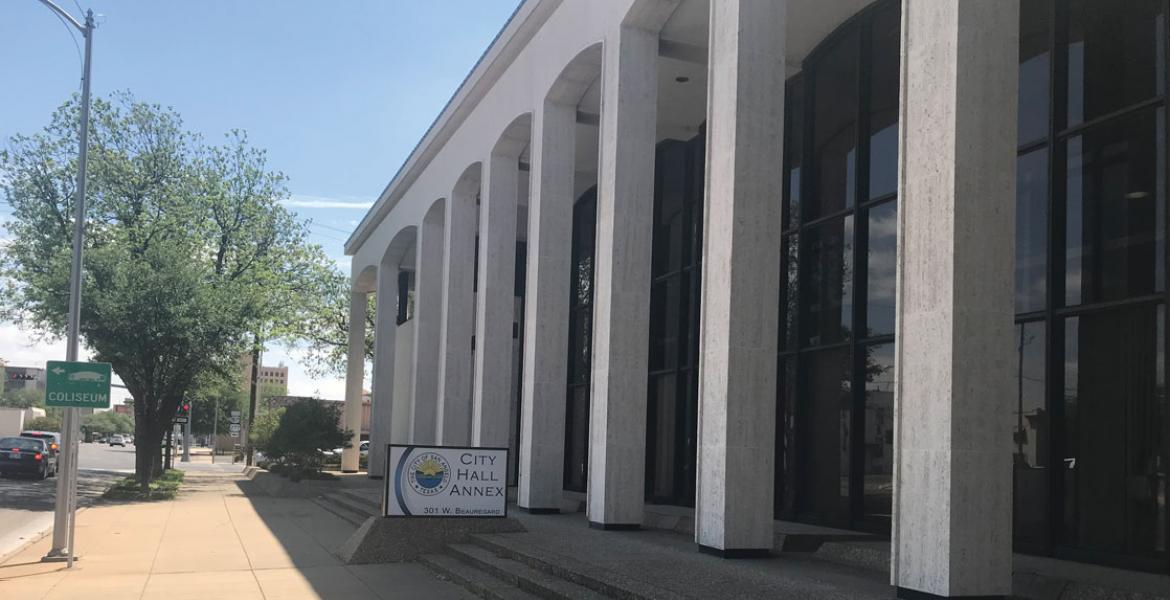SAN ANGELO, TX — San Angelo City Manager Daniel Valenzuela worries about maintaining public safety budgets in the wake of the double-whammy of a pandemic topped by an oil industry bust. He sits in the hot seat in San Angelo, a city with a population a smidgeon over 100,000 people, located on the eastern edge of the oil fields of the Permian Basin. Monday, the May 2020 oil futures contract fell to historic lows, at minus-$38. The COVID-19 pandemic has reduced worldwide demand for oil to the point that there is no place left to store what is pumped out of the ground.
“The scary part is that this is unprecedented,” Valenzuela said. “Not even the recession of 2008 had everything happen at the same time.”
Valenzuela led the City of San Angelo through the oil bust of 2015. Sales tax revenue fell while real estate valuations flattened back then. That experience informed Valenzuela’s conservative approach for counting sales tax revenue in the FY 2020 budget. The City’s general revenue is funded with property tax receipts and the City’s 1-cent portion of the 8.25-percent sales tax the State of Texas collects. A half cent is dedicated to the City of San Angelo Development Corporation for economic development projects. The county government receives the remaining half cent.
Breakdown of sales tax revenue collected inside the City of San Angelo:
- State: 6.25%
- City of San Angelo: 1%
- City of San Angelo Development Corporation: 0.5%
- Tom Green County: 0.5%
Valenzuela said he is expecting the worst when it comes to a drop in sales tax revenue. He said he is planning for a 50-percent drop year-over-year. The City forecasted it would receive $18.6 million in sales tax for FY 2020.
San Angelo, like the majority of municipalities in Texas, cannot generally receive direct aid from the federal government’s CARES Act like big Texas cities are. The CARES Act enacted this month with President Donald Trump’s signature is “showering millions” on cities like Austin, The Austin Bulldog reported yesterday. The City of Austin will receive $170.8 million to cover expenditures for the public health disaster. Cities with less than 500,000 population are not eligible for these kinds of CARES Act federal grants, Valenzuela said.
“We have six cities in Texas with more than 500,000 in population, representing 7.7 million Texans,” Valenzuela said. Yet, smaller municipalities and counties represent the majority of the 29 million people living in Texas, he continued.
San Angelo and the rest of the smaller governments apply through the State for disaster relief. So far, Valenzuela is optimistic about San Angelo’s ability to find and qualify for outside money. The City received a $338,000 Community Development Block Grant from the State and, a outlier for funding, San Angelo’s municipal airport Mathis Field received a $1.2 million federal grant from the CARES Act. Airport grants are generally always funded with direct federal aid.
Other monies Valenzuela expects the City to receive are:
- Approximately $78,000 from a Bureau of Justice Assistance grant
- Approximately $96,000 from the Texas Health and Human Services to aid with loss of revenue for ambulance fees. This payment comes with some conditions for future billings.
- Reimbursement of expenditures related to non-congregate sheltering.
- The City has also seeking a 75%/25% local match Request for Public Assistance from the Federal Emergency Management Agency (FEMA).
With the exception of the airport money, none of these funding sources are from the CARES Act.
Valenzuela said his two primary concerns are adequately funding public safety — the police and fire departments — and keeping the water department solvent. Police and fire are financed about 75 percent of the way using property tax revenue. But the balance is paid with sales tax revenue.
“We are looking at every contingency,” Valenzuela said. That includes a hiring freeze and to allow attrition to lower headcount. He said the City is also moving employees around to new positions to maximize productivity.
The water department’s cash flow will be greatly reduced by the inability of unemployed residents to pay their bill and the City’s decision early on not to disconnect accounts that are delinquent. Water usage and billing revenue are also down due to the State-mandated shutdown. Valenzuela said City staff is seeking special considerations for outside funding for the water enterprise fund.
Valenzuela noted that going into this crisis the City had a cushion in its general fund and in the water enterprise fund. That buys the City time to react. Now he is gathering the data to make decisions on how to outlast the shutdowns.
If the shutdowns continue past the duration where federal aid was provided to small businesses to survive, there will be a ripple effect of declining revenue to all local governments here. If businesses cannot pay their rent, landlords will default on their loans, and property values can decrease if the commercial real estate properties are sold at fire sale prices. At the same time, every day a restaurant or bar remains closed, those businesses are not generating sales tax revenue.
Valenzuela said he wants to present a plan to the State to open San Angelo up faster than Governor Greg Abbott’s re-opening plan. San Angelo suffered 41 COVID-19 cases during the height of the crisis. As of Monday, four days had elapsed without a report of a COVID-19 positive case. The hospitals are 57 percent empty and no lab-positive COVID-19 patients are hospitalized as of Monday. That leaves plenty of infrastructure to handle patients.
Re-open San Angelo safely, but we shouldn’t be held back by situations in the larger metro areas of Texas, Valenzuela said.
Subscribe to the LIVE! Daily
Required






Comments
Something is telling me higher taxes are headed our way.
There should be a hiring freeze implemented.
I've already been informed that I'll not be receiving a cost of living increase this year.
So what's good for the goose is good for the gander.
I purchased my house 10 years ago on a non variable interest rate. Because of higher valuations and increases in the tax rate plus insurance increases due to over valuation rates. My house payment has almost doubled from 10 years ago.
Enough is enough.
- Log in or register to post comments
PermalinkPost a comment to this article here: